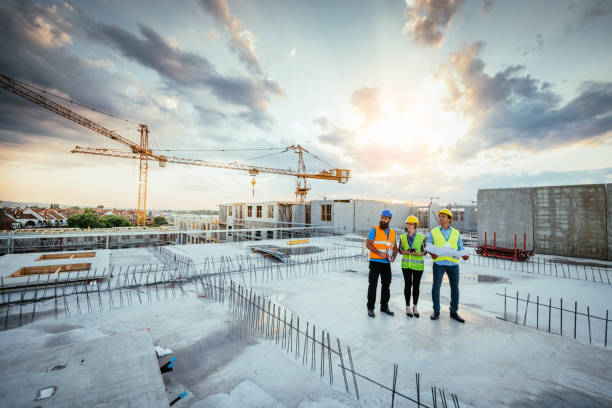Expert Construction Services for All Your Building Needs
Construction services encompass a wide range of building types. From residential homes to commercial properties, the specialization of the construction team can significantly affect the outcome. Residential contractors focus specifically on home improvements, including single-family homes, apartments, and condominiums. In contrast, commercial contractors often deal with larger structures such as office buildings, retail spaces, and warehouses. It is crucial to match the right specialist with the project requirements to ensure not only compliance with local codes but also that the end result aligns with client expectations. Knowledgeable professionals can navigate zoning laws and building regulations, which vary greatly across regions, ensuring a smoother building process.

How Does Thoughtful Design and Planning Lay the Groundwork for Successful Construction Outcomes?
The foundation of any successful construction project begins long before the first shovel breaks ground. Thoughtful design and planning lay the groundwork for successful construction outcomes by establishing clear project parameters, identifying potential challenges, and creating detailed blueprints that guide every phase of construction. Professional architects and engineers work closely with clients to understand their needs, assess site conditions, and develop comprehensive plans that optimize space utilization while adhering to building regulations.
During the planning phase, experienced construction professionals conduct thorough site evaluations, soil testing, and feasibility studies. This preliminary work helps prevent costly delays and modifications during construction. Design considerations include structural integrity, electrical and plumbing systems, ventilation requirements, and accessibility compliance. Modern planning also incorporates advanced technologies like Building Information Modeling (BIM) software, which creates detailed 3D models that allow stakeholders to visualize the finished project and identify potential issues before construction begins.
Why Is Effective Project Management Essential for Construction Success?
Effective project management boosts productivity and keeps builds on schedule and within budget through systematic coordination of resources, timelines, and personnel. Construction project managers serve as the central hub for communication between architects, contractors, subcontractors, suppliers, and clients. They create detailed project schedules, monitor progress against milestones, and proactively address challenges that could derail the construction timeline.
Successful project management involves careful resource allocation, ensuring that materials arrive on schedule and skilled workers are available when needed. Modern project managers utilize sophisticated software tools to track inventory, monitor labor costs, and maintain real-time communication across all project stakeholders. Regular site inspections and progress meetings help identify potential bottlenecks early, allowing for swift corrective action that prevents minor issues from becoming major setbacks.
How Are Sustainable Building Practices Reshaping Modern Construction?
Sustainable building practices are reshaping modern construction for long-term benefits that extend far beyond the initial construction phase. Today’s construction services increasingly incorporate eco-friendly materials, energy-efficient systems, and waste reduction strategies that minimize environmental impact while reducing long-term operational costs for building owners.
Green construction techniques include the use of recycled materials, locally-sourced components, and renewable energy systems like solar panels and geothermal heating. Water conservation features such as rainwater harvesting systems and low-flow fixtures help reduce utility costs while supporting environmental stewardship. Many construction companies now pursue LEED (Leadership in Energy and Environmental Design) certifications for their projects, demonstrating their commitment to sustainable building practices that benefit both clients and communities.
What Role Do Quality Assurance and Safety Standards Play in Construction?
Quality assurance and safety standards are essential for durability and compliance throughout every phase of construction. Professional construction services implement rigorous quality control measures that ensure materials meet specifications, workmanship adheres to industry standards, and finished structures comply with all applicable building codes and safety regulations.
Safety protocols protect workers, visitors, and future occupants through comprehensive training programs, proper equipment usage, and strict adherence to Occupational Safety and Health Administration (OSHA) guidelines. Regular inspections by qualified safety officers help identify and address potential hazards before accidents occur. Quality assurance processes include material testing, structural inspections, and system verification to ensure that electrical, plumbing, and HVAC installations function properly and meet design specifications.
Construction Service Types and Specializations
Construction services span multiple specializations, each requiring specific expertise and equipment. Residential contractors focus on single-family homes, apartments, and condominiums, offering services from new construction to renovations and additions. Their expertise includes understanding local zoning laws, residential building codes, and homeowner association requirements.
Commercial contractors handle larger projects such as office buildings, retail spaces, warehouses, and industrial facilities. These projects often require specialized knowledge of commercial building codes, accessibility requirements, and complex mechanical systems. Infrastructure contractors specialize in public works projects including roads, bridges, water treatment facilities, and municipal buildings.
| Service Type | Typical Cost Range | Project Duration | Key Considerations |
|---|---|---|---|
| Home Renovation | $15,000 - $150,000 | 2-8 months | Permits, living arrangements |
| New Home Construction | $200,000 - $800,000 | 6-12 months | Land preparation, utilities |
| Commercial Building | $100-$400 per sq ft | 8-24 months | Zoning compliance, parking |
| Industrial Facility | $50-$200 per sq ft | 12-36 months | Environmental permits, utilities |
Prices, rates, or cost estimates mentioned in this article are based on the latest available information but may change over time. Independent research is advised before making financial decisions.
Selecting the Right Construction Partner
Choosing the appropriate construction service provider requires careful evaluation of their experience, licensing, insurance coverage, and track record with similar projects. Reputable contractors maintain proper licensing for their jurisdictions, carry comprehensive liability insurance, and provide references from recent clients. They should demonstrate familiarity with local building codes, permit processes, and inspection requirements.
The construction landscape continues evolving with new technologies, materials, and methodologies that improve efficiency and quality. Professional construction services stay current with industry innovations while maintaining the fundamental principles of safety, quality, and client satisfaction that define successful building projects. Whether undertaking a small residential improvement or a major commercial development, partnering with experienced construction professionals ensures your project meets expectations while adhering to the highest standards of craftsmanship and regulatory compliance.




